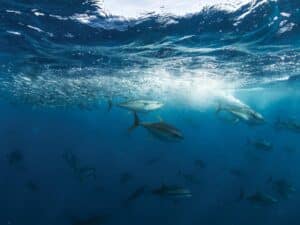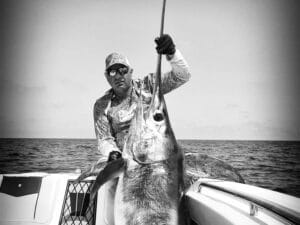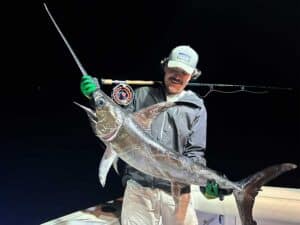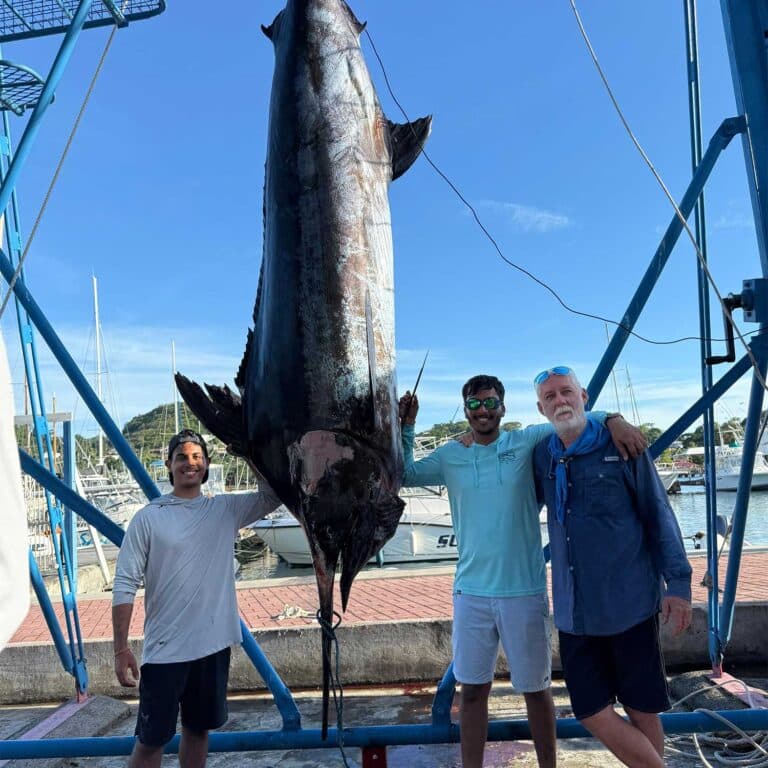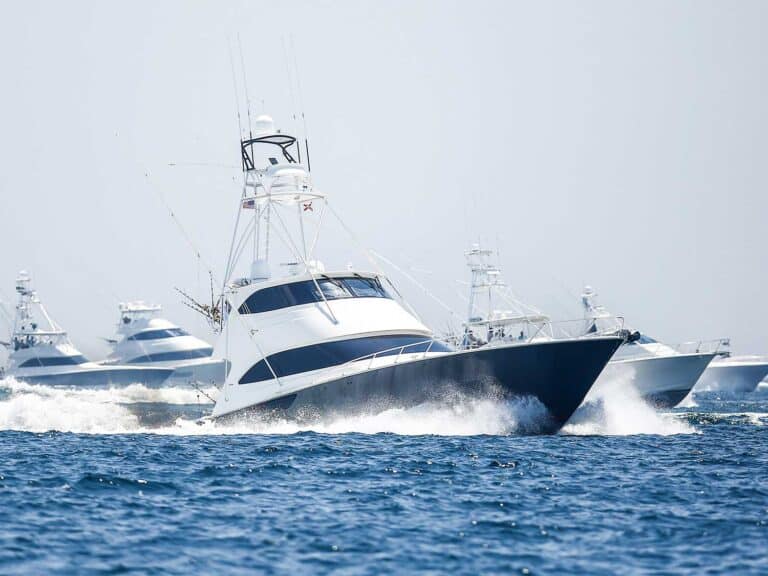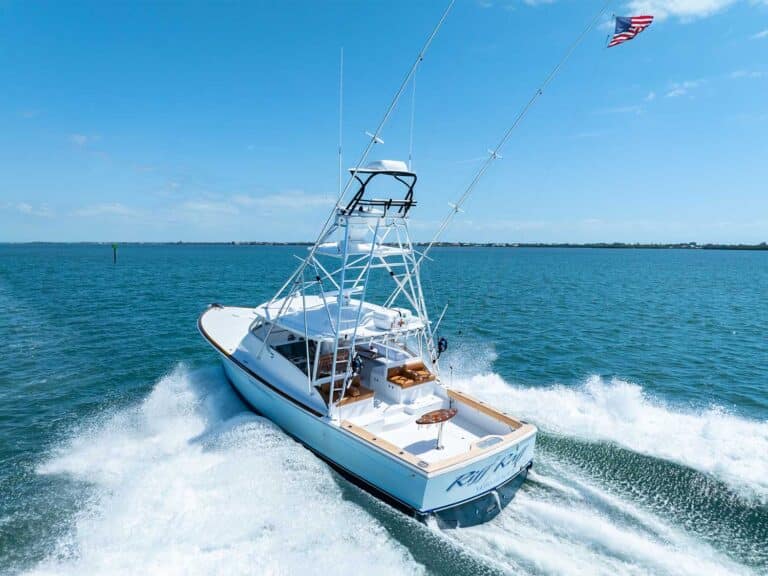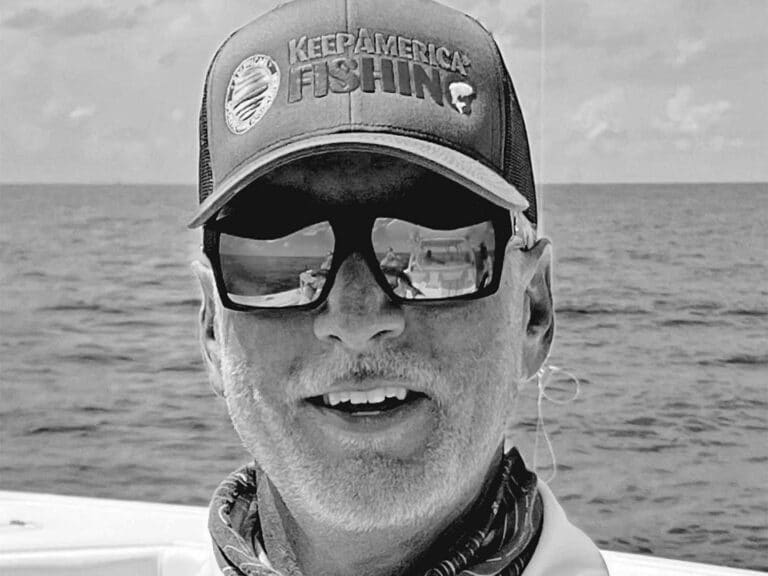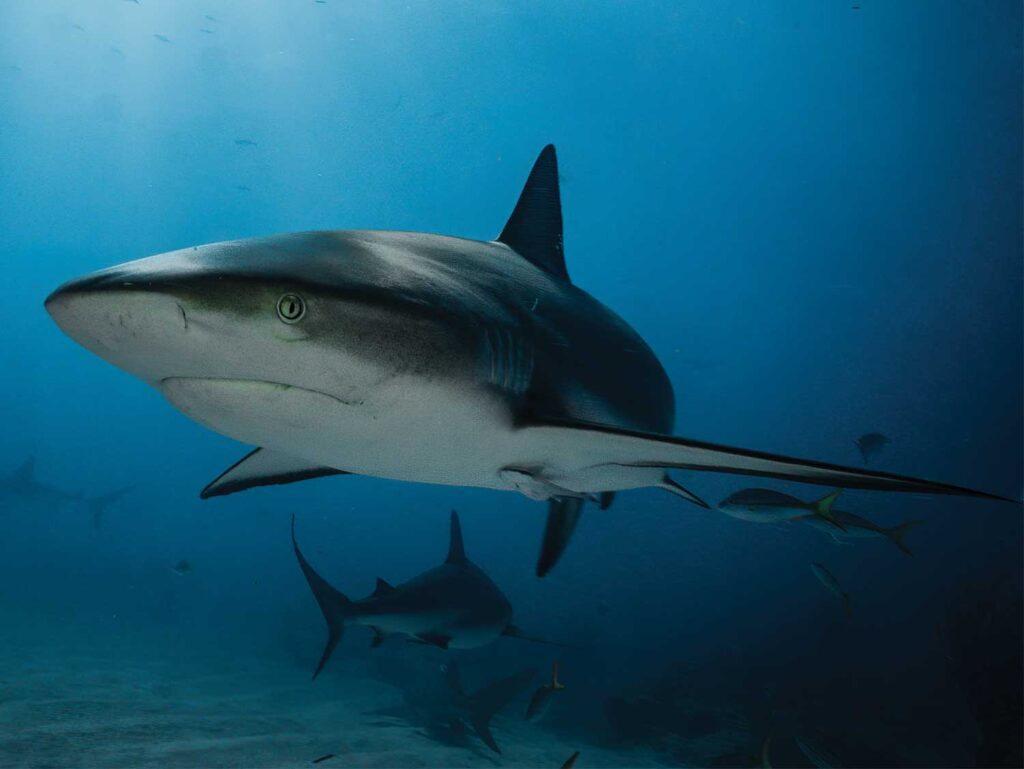
Special delivery: Sign up for the free Marlin email newsletter. Subscribe to Marlin magazine and get a year of highly collectible, keepsake editions – plus access to the digital edition and archives.
During the 65th-annual Big Rock Blue Marlin Tournament in North Carolina this past June, a surprising controversy took place: the disqualification of the tournament-winning marlin. The crew aboard Sensation landed a 619.4-pound blue marlin, easily the largest caught throughout the event, and the crew expected to win more than $3.5 million. Upon closer inspection, however, tournament weighmasters noticed that the marlin had several bite marks near its tail, indicating that it had been mutilated during the fight by a shark or other oceanic predator. According to the tournament rules, the bite(s) led to the disqualification. While Sensation’s encounter might appear to be a rare occurrence to the non-angling community, it sheds light on a burgeoning problem in our oceans—a growing number of shark encounters and shark depredation.
I serve as the president of the American Sportfishing Association, the trade association representing the recreational-fishing industry and community. Our organization supports multiple policy efforts across the country, almost all of which are dedicated to increasing access to the water and ensuring that fish populations remain healthy. I am also an avid angler and know from experience that the thrill of that catch is one of the reasons saltwater sport fishing is undeniably one of the most rewarding outdoor activities out there, and we should ensure that this sport can be enjoyed for years to come.
As the ASA navigates various federal and state policies, we deal with various restrictions on when you can fish and where you can fish. While these restrictions usually relate to the health of fishery populations, shark encounters and shark depredation are on the rise nationally and worsening in recent years.
Shark Encounters on the Rise
Sharks are a vital part of our oceans. In fact, encountering sharks while fishing is a natural occurrence and, frankly, can be part of the experience. However, shark encounters are becoming more and more frequent, and while we are unsure of the cause, it is leading to lost catches, safety concerns, and for the thousands in the sport-fishing industry who work in tackle shops and as charter captains and fishing guides throughout the country, lost business.
According to a survey published this past summer by North Carolina State University, 77 percent of anglers who participated in the study experienced depredation over the course of the past five years. Additionally, among anglers who experienced shark depredation, 90.3 percent encountered it more than once, while more than half ran into at least 20 depredation events over the previous five years. The study also identified the types of fish that are most likely to be depredated by sharks, with yellowfin tuna, king mackerel and snapper species being the most likely. Unless serious actions are taken to address this issue, we can only expect the number and type of affected species to keep increasing.
Economic Impacts and Growing Concerns
Shark encounters aren’t just an irritating problem for anglers looking to spend a relaxing day on the water, but they are also creating a serious adverse economic impact on our sport. The impacts from depredation don’t just affect fishing tournaments; they can also trickle down to the local communities that support fishing.
Shark encounters lead to losses of tackle and bait, longer days on the water, and lost catches. Multiplied throughout an entire season, this can lead to thousands of dollars in additional costs that charter captains and anglers must spend on equipment, and for many, leads to this question: What’s the point of even going fishing if it’s impossible to land your catch?
Four Solutions
Anglers are this country’s original conservationists. Safeguarding our marine ecosystem and a balance between all species—including sharks—is vital. Last year, the ASA developed a new policy position to mitigate shark encounters and protect anglers from this growing issue. Our recommendations to mitigate shark depredation covers four areas: education, management, policy and research.
Education can be an effective way to help anglers avoid and respond to sharks, although in some cases depredation might be inevitable. Because shark interactions are increasing, teaching anglers how to avoid sharks and respond to them in the short term is crucial. Educational messaging will evolve as we continue to learn more about shark interactions.
Management is another crucial aspect of a comprehensive mitigation strategy. NOAA Fisheries and other fishery managers should consider how shark-mitigation policies can affect fisheries, and vice versa. A holistic approach that balances species interactions could be beneficial, allowing anglers to turn discards and fish damaged by sharks into retained fish. While there might be some interest in increasing harvests for sharks, this should be done only if the stocks are healthy and supported by sound science.
Policy changes are necessary to limit shark depredation. One potential reason for increased incidents is that sharks are learning to associate boats with a free meal. The ASA supports amending the Magnuson-Stevens Fishery Conservation and Management Act to prohibit shark-feeding tours nationwide, building on the current bans in Hawaii and the western Pacific. Indiscriminate commercial fishing for sharks should be avoided to prevent increased bycatch of important recreational species and other protected species.
Research is essential to understanding the frequency of shark encounters and why conflicts with fishing occur. More research is needed to identify the species involved, the physiological cues that lead sharks to become habituated to people, how angler behaviors and regulatory frameworks influence shark interactions, and how to prioritize shark-stock assessments to evaluate sustainable harvest opportunities. Research should also focus on developing new techniques and strategies to limit shark interactions, including the use of deterrents.
New Federal Legislation
The ASA is also leading the charge and supporting new federal legislation, Supporting the Health of Aquatic systems through Research, Knowledge and Enhanced Dialogue, also known as the SHARKED Act, to address this issue at the national level. In June, Congressmen Rob Wittman (R-Va.), Darren Soto (D-Fla.), Garret Graves (R-La.) and Marc Veasey (D-Tex.) introduced the act, a crucial step toward addressing shark depredation. If enacted, the SHARKED Act would establish a task force responsible for improving coordination and communication on shark depredation across the fishery-management community. This bill will establish foundational knowledge that can be used to improve future management, education and research actions. As of late August, the SHARKED Act awaits debate before the full House Committee on Natural Resources.
Mitigating shark depredation requires a multifaceted approach that respects the intrinsic value of sharks while addressing the concerns of fishing communities. The SHARKED Act is a significant first step. While all of us at the ASA support this important bill, we need your help. Through our Keep America Fishing Action Alert portal, which is found under our Advocacy portal on our website at asafishing.org, please send a brief message to your members of Congress asking them to support this legislation. Together, we can protect our sport and the anglers while also making a significant impact on the future of shark depredation.
